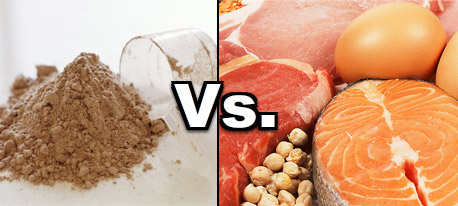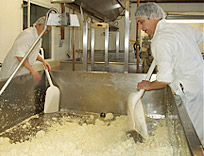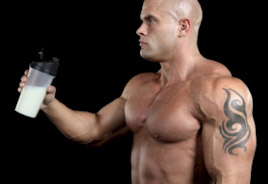WHEY PROTEIN POWDER SHAKES VS. “REAL” WHOLE FOODS

“Yeah man, it’s okay to include some whey protein in your diet, but most of your protein should be coming from whole foods.”
If you browse the online bodybuilding forums or read articles from your typical run-of-the-mill “guru”, this is the standard piece of advice you’ll get on the issue of whey protein vs. whole foods.
You’ll be told that whey protein is fine to use as a supplement, but that whole food proteins are somehow superior and will produce better results when it comes to muscle gain, fat loss and overall health.
The problem is that… well… this is complete and total nonsense.
Whey Protein Vs. Whole Foods: The Reality
The fundamental error in this debate is that there’s no reason to separate whey protein and whole foods into two categories to begin with.
In reality, they’re the same thing.
Whey protein is a natural dairy derivative that is isolated during the process of turning milk into cheese. It’s “food” in the same way that steak, chicken and eggs are food.

In fact, about 20% of the protein content in the milk that you drink is derived from whey.
This is why people should stop viewing whey as a “supplement” and instead view it as one component of their whole food diet in the same way they view any other protein source.
The whole idea of “whey protein vs. whole foods” makes no sense to begin with.
It’s all food. Fish, cottage cheese, whey powder. Food, food, food.
Not only that, but those who tell you that “traditional” bodybuilding whole foods like chicken or steak are superior to whey protein are actually wrong – quite the opposite is true.
Now that we’ve established that whey protein and whole foods are actually the same thing, all we have to do is compare them objectively to see how whey stacks up…
1) Bio-Availability
Whey has the highest bio-availability of any protein available, meaning that your body will absorb and utilize the highest percentage of the total protein content in comparison to any other source.
2) Amino Acid Profile
Whey protein delivers the highest concentration of the most valuable amino acids involved in supporting muscle recovery and growth. (l-leucine, l-valine and l-isoleucine)
3) Carb/Fat Content
Whey delivers the most isolated source of protein possible, with the highest quality whey isolates providing zero fat and only 1 gram of carbs per serving.
4) Convenience
Because of its powdered form, whey is easily the most convenient source of protein out there. It can be used to mix up a quick liquid shake, sprinkled on top of your oatmeal/yogurt/cereal or used to make a variety of quick and easy recipes.
In addition to the above benefits, whey protein also improves immune system health (by raising glutathione levels), regulates appetite, increases serotonin production (which regulates mood/anxiety) and has direct fat burning properties as well.
Whey Protein Vs. Whole Foods: Wrapping It Up

As you can see, not only is whey protein a “whole food” just like any other; it’s actually the highest quality source you can possibly consume.
As they used to say in Italy in the 1600’s, “Chi vuol viver sano e lesto beve scotta e cena presto”… which translates to, “If you want to live a healthy and active life, drink whey and dine early.”
Don’t fall into the trap of viewing whey as some sort of separate “supplement”. Instead, incorporate it into your overall diet in the same way you would any other food source.
If you found this article helpful, make sure to sign up for your FREE custom fitness plan below...




